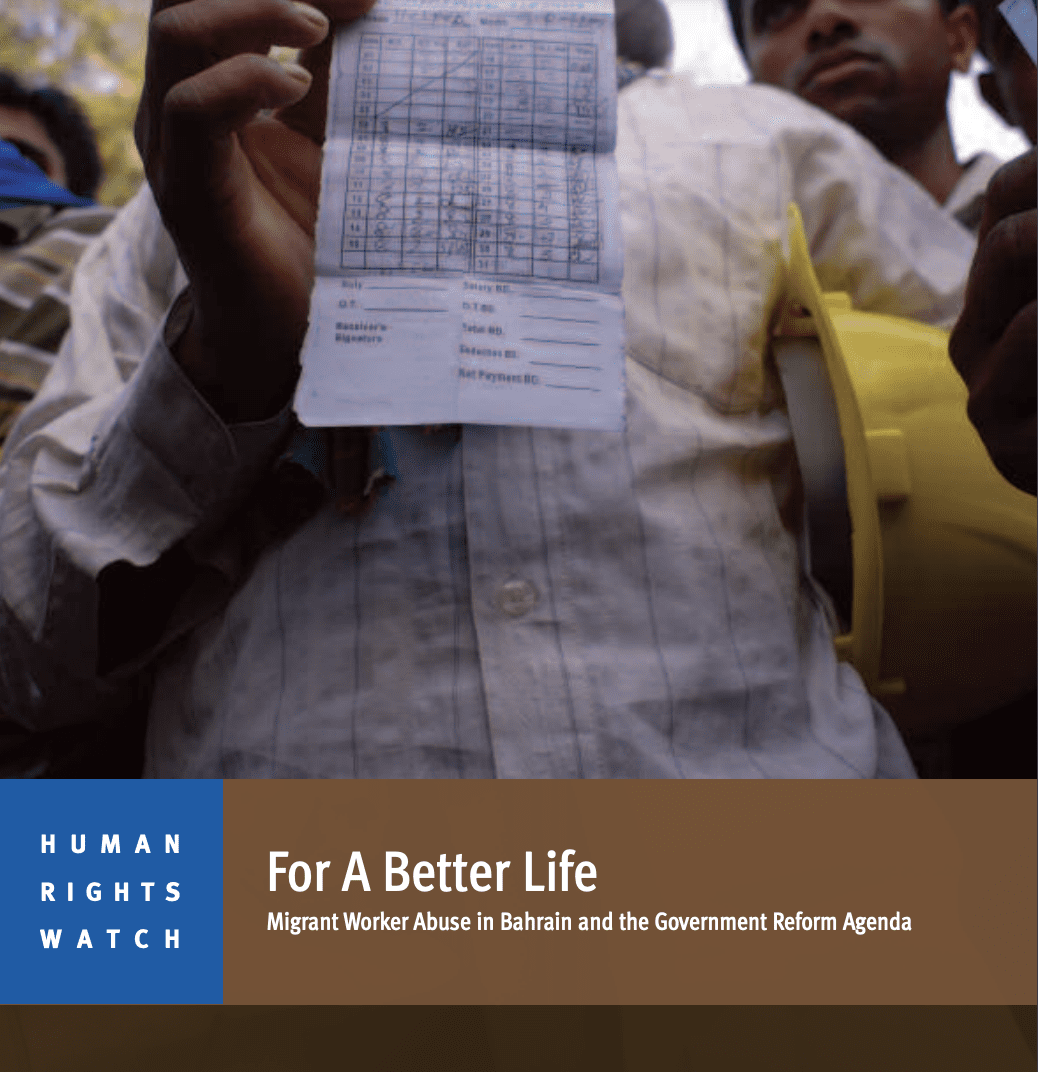
For a Better Life Migrant Worker Abuse in Bahrain and the Government Reform Agenda
Summary
After the first time she hurt me it came to my mind that I want to go back to the Philippines. But then I thought if I go back to the Philippines, what will happen to my family? I cannot support them if I’m back there. But it was too late. Every day madam beat me.
– Maria C., migrant domestic worker, Manama, January 2010.
I received only one [full] salary, and for the other months I got BD27 [$72], but signed for the full amount. The foreman said, “You’ll get the rest in two days, it’s not a problem, so just sign it.” When he said that, I signed it. After working for five months, I asked for my money but they didn’t give me my money. [The site engineer] told me, “Do your work; I’m not going to give you money. We’re only going to give you money for food, BD15 [$40] for 30 days.” I told him, don’t give me money for food, send me home—I paid 80,000 rupees [$1705] on my house and I have to give it back. He said, “There is no money, go to the Labor Ministry, go to the embassy, you won’t get your money.”
-Sabir Illhai, migrant construction worker, Manama, February 2010.
For over three decades, millions of workers—mostly from south and southeast Asian countries such as India, Bangladesh, Sri Lanka, and the Philippines—have flocked to the Persian Gulf in the hope of earning better wages and improving the lives of their families back home.
Most of these workers come from impoverished, poorly-educated backgrounds and work as construction laborers, domestic workers, masons, waitresses, care givers, and drivers. Providing construction and service industries with much-needed cheap labor, they have helped fuel steady economic growth in countries such as Saudi Arabia, the United Arab Emirates (UAE), Kuwait, Qatar, and Bahrain.
Despite their indispensable contribution to the life of their Gulf hosts, many workers have experienced human rights and labor rights abuses, including unpaid and low wages, passport confiscation, restrictions on their mobility, substandard housing, food deprivation, excessive and forced work, as well as physical, psychological, and sexual abuse.
The small island nation of Bahrain, with approximately 1.3 million residents, has earned a reputation among labor-receiving countries in the Gulf as the most committed to improving migrant labor practices. Its efforts include new safety regulations, measures to combat human trafficking, workers’ rights education campaigns, and reforms aimed at allowing migrants to freely leave their jobs. However, questions remain about the implementation and adequacy of these reforms.
This report explores the experience of Bahrain’s more than 458,000 migrant workers who make up around 77 percent of the country’s workforce—most working in unskilled or lowskilled jobs, in industries such as construction, retail and wholesale and domestic work. The report traces the many forms of abuse and exploitation to which migrant workers in Bahrain are subjected by employers and the obstacles and failures that prevent them from seeking effective redress for such treatment. It outlines the rights and international legal standards that apply to workers, and calls on the governments of Bahrain and of labor-sending countries to adopt additional protections for migrant workers in Bahrain.
Read more here.
